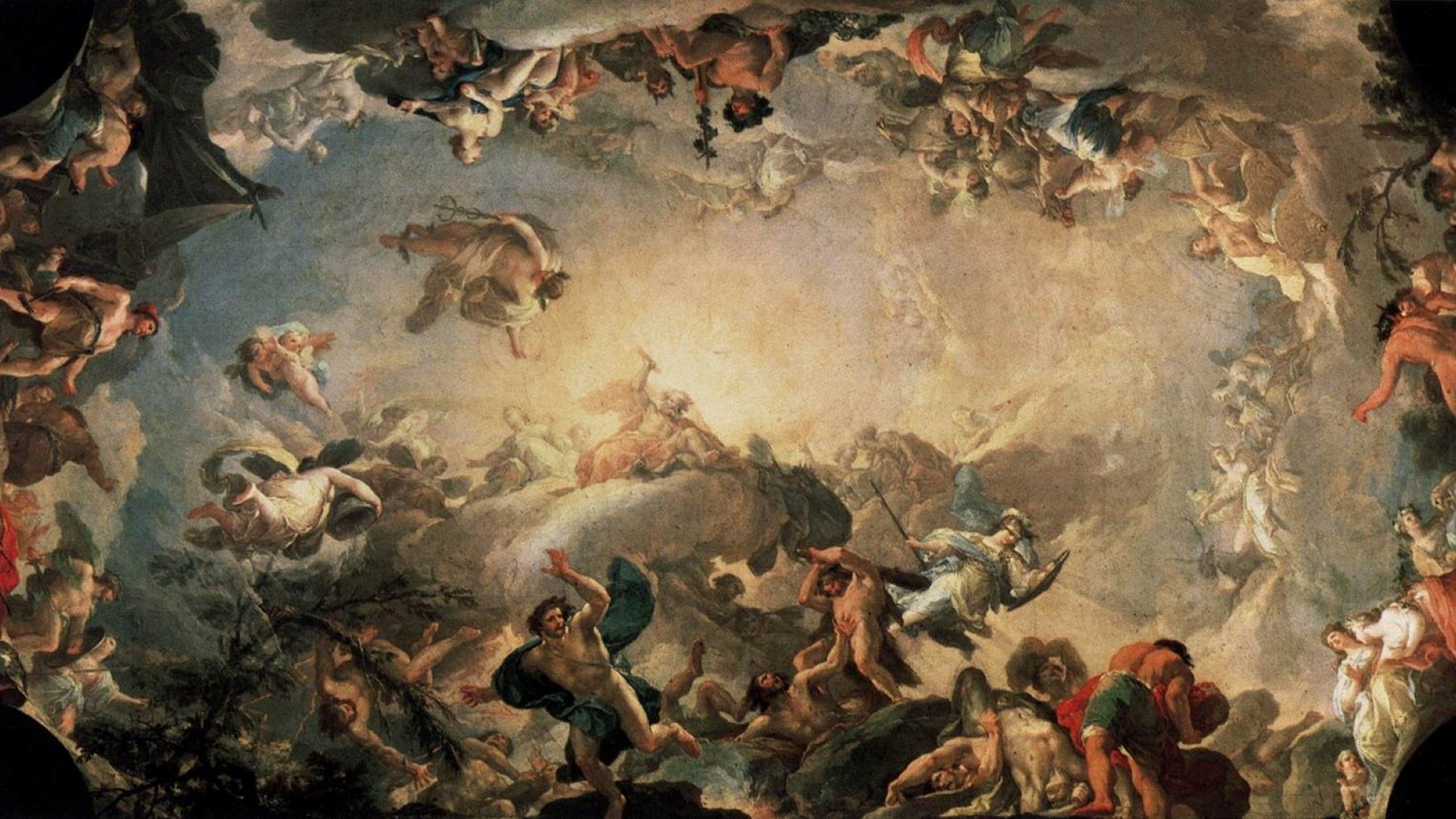
Eurytus of Oechalia
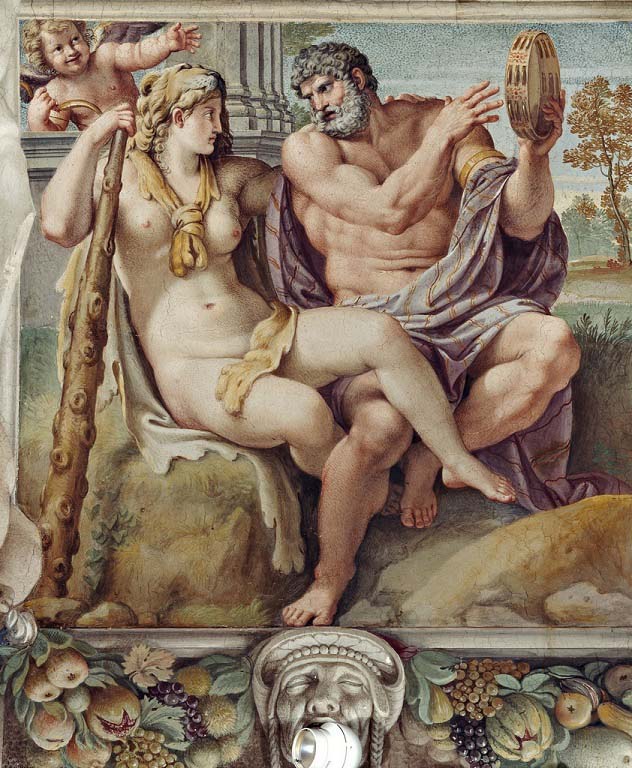
In Greek mythology King Eurytus (Ancient Greek: Εὔρυτος) of Oechalia (Οἰχαλίᾱ), Thessaly, was a skillful archer who even said to have instructed Heracles in his art of using the bow.
Eurytus was the son of Melaneus either by Stratonice, daughter of King Porthaon of Calydon and Laothoe or by the eponymous heroine Oechalia. He married Antiope, daughter of Pylon (son of Naubolus) and had these children: Iphitus, Clytius, Toxeus, Deioneus, Molion, Didaeon, Hippasus and a very beautiful daughter, Iole.
A late legend also attributes Eurytus as the father of Dryope, by his first wife. Hesiod calls his wife Antioche and they had four sons but Creophylus says only two.
Eurytus' grandfather was Apollo, the archer-god, and was also a famed archer. Eurytus has been noted by some as the one who taught Heracles the art of archery.
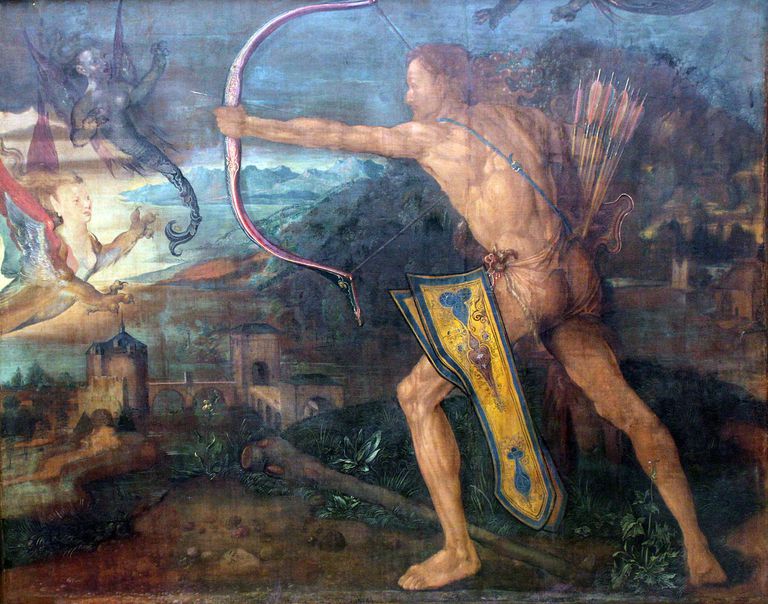
Mythology
Contest with a god
According to Homer, Eurytus became so proud of his archery skills that he challenged Apollo. The god killed Eurytus for his presumption, and Eurytus' bow was passed to Iphitus, who later gave the bow to his friend Odysseus. It was this bow that Odysseus used to kill the suitors who had wanted to take his wife, Penelope.
Sacking of Oechalia
A more familiar version of Eurytus' death involves a feud with Heracles. Heracles would come Oechalia and compete for the hand in marriage of the beautiful Iole. Some say that it was actually Eurytus who had trained Heracles in the skills of the archer, although some also say that the role of the trainer was Rhadamanthys. In either case, the skill of Heracles was greater than that of Eurytus or any of his sons.
Eurytus then decided to renege on his promise, and the king forbade Heracles to wed Iole. Eurytus was worried about the safety of his daughter with Heracles, for Heracles had after all killed his first wife, Megara, and his children during a fit of madness.
It was a decision that the sons of Eurytus, bar Iphitus agreed to. Iphitus believed that the promise made should be upheld.
Heracles left in anger, and soon after twelve of Eurytus' mares were stolen. Some have written that Heracles stole the mares himself, while others have said Autolycus stole the mares and sold them to Heracles. In the search for the mares, Iphitus, who was convinced of Heracles' innocence, invited Heracles to help and stayed as Heracles' guest at Tiryns.
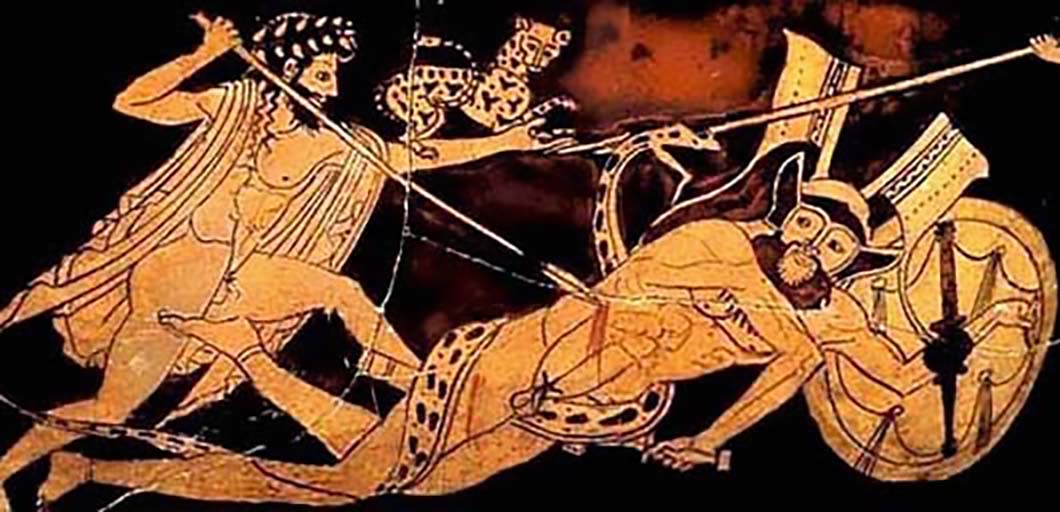
Heracles invited Iphitus to the top of the palace walls and, in a fit of anger, threw Iphitus to his death. For this crime, Heracles was forced to serve the Lydian queen Omphale as a slave for either one or three years. Some say Omphale would become Heracles’ second wife, and the Oracle also told Heracles to pay compensation to King Eurytus for the death of his son. The compensation offered to King Eurytus was refused though, and so again the king of Oechalia had angered Heracles.
The compensation offered to King Eurytus was refused though, and so again the king of Oechalia had angered Heracles.
Later, at a time when Heracles had wed Deianira, the hero would decide to have his vengeance upon King Eurytus, and so Heracles marched with an army against the small kingdom.
The defences of Oechalia were no match for Heracles, and soon the city had fallen to the demi-god, and King Eurytus and his sons were put to the sword by Heracles.
Heracles would then return, but he was not alone, for he took Iole, the daughter of King Eurytus and the woman who he had once been promised, as his concubine. The jealousy that this aroused in Deianira would ultimately lead to the death of Heracles.
According to a tradition in Athenaeus, the hero put them to death because they had demanded a tribute from the Euboeans.
The remains of the body of Eurytus were believed to be preserved in the Carnasian grove; and in the Messenian Oechalia sacrifices were offered to him every year.

The various "Eurytus" in Greek Mythology and History
Eurytus is the name of several characters in Greek mythology, and of at least two historical figures.
Eurytus, king of Oechalia, Thessaly, and father of Iole and Iphitus.
Eurytus, son of Molione, by either Poseidon or Actor.
Eurytus or Erytus was the son of Hermes and Antianeira or Laothoe, and brother of Echion. He was one of the Argonauts, and also hunted the Calydonian Boar.
Eurytus, son of Hippocoön was killed, along with his brothers, by Heracles.
Eurytus, the Greek leader of the Epeans (from Elis) and Taphians (who lived in the islands off the coast of Acarnania) during the Trojan War, and an ally of Elephenor. According to Quintus Smyrnaeus, he was killed by Telephus's son Eurypylus.
Eurytus, a chieftain at the court of king Cepheus, and was killed by Perseus during the battle between the latter and Phineus.
Eurytus, king of Caria and the father of Eidothea, who was one of the possible spouses of Miletus.
Eurytus, an Elean prince as one of the children of King Augeas.
Eurytus, one of the Giants, sons of Gaia, killed by Dionysus during the Gigantomachy, the battle of the Giants versus the Olympian gods.
Eurytus, a Centaur present at the wedding of Pirithous and Hippodamia, and the one that caused the conflict between the Lapiths and the Centaurs by trying to carry the bride off. The most violent of the centaurs involved in the battle with the Lapiths, he was killed by Theseus.
Eurytus, father of Clonus. His son was known for having made the belt of Pallas.
Eurytus, an alternate name for Eurypylus of Cyrene.
Eurytus, a Spartan warrior, one of the Three Hundred sent to face the Persians at the Battle of Thermopylae in 480 BC.
Eurytus a Pythagorean philosopher (fl. 400 BC).
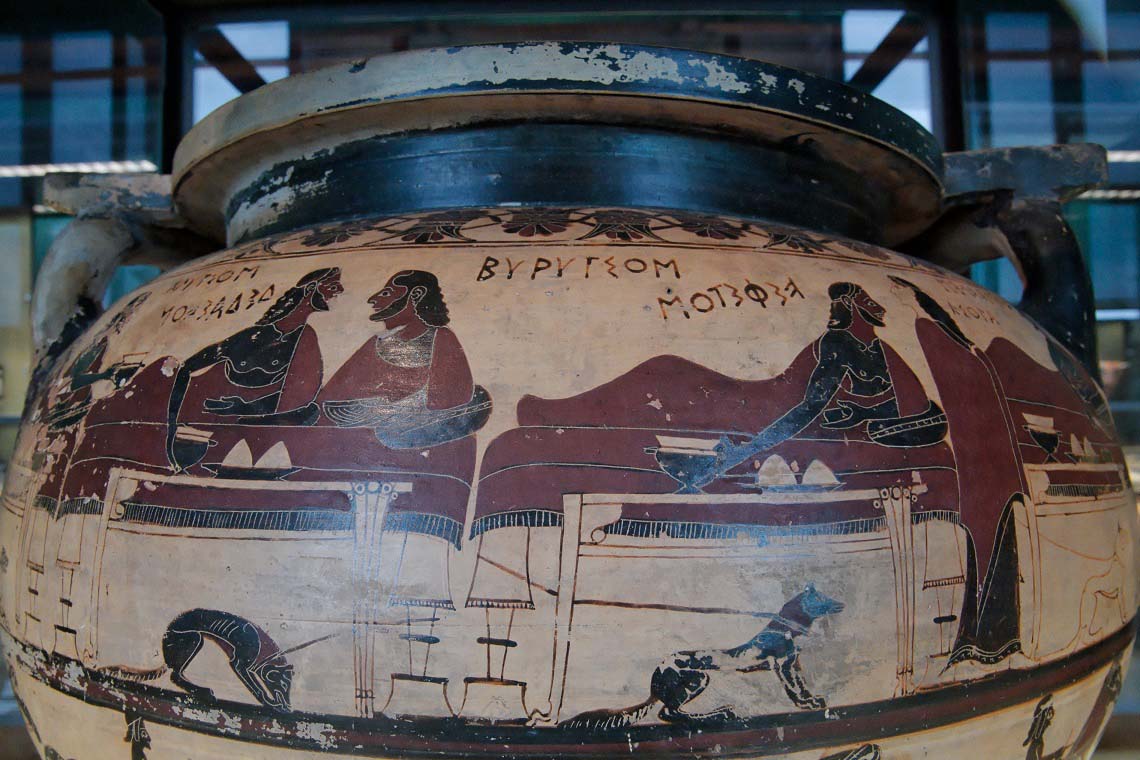
Sources
Pseudo-Apollodorus, Bibliotheca 2.4.9
Scholaist on Sophocles, Trachiniae 268
Theocritus, Idylls 25.105
Hesiod, Catalogue of Women fr. 26. 7
Hyginus, Fabulae 173
Ovid, Metamorphoses 8.313
Ovid, Metamorphoses 9.325 ff.
Scholaist on Sophocles, Trachiniae 266 as cited in Hesiod, The Homeric Hymns, and Homerica, The Taking of Oechalia fr. 4
Homer, Odyssey 8.226
Pseudo-Apollodorus, Bibliotheca 2.6.1
Pseudo-Apollodorus, Bibliotheca 2.7.7
Athenaeus, Deipnosophistae xi p. 461
Apollonius Rhodius, Argonautica 1.52 - 56
Pseudo-Apollodorus, Bibliotheca 1.9.16
Hyginus, Fabulae 14, 160 & 173
Pseudo-Apollodorus, Bibliotheca 3.10.5
Euripides, Iphigenia in Aulis 282
Quintus Smyrnaeus, The Fall of Troy 8.111
Ovid, Metamorphoses 5.79 ff.
Antoninus Liberalis, Metamorphoses 30
Diodorus Siculus, Bibliotheca historica 4.33.3
Pseudo-Apollodorus, Bibliotheca 1.6.2
Ovid, Metamorphoses, 12.220 & 235 ff
Virgil, Aeneid 10.499
Scholia on Apollonius Rhodius, Argonautica 4.1561, referring to Philarchus for the alternate names
"Wikipedia"
Our Mobile Application
Check out Our Mobile Application "Ancient Greece Reloaded"


